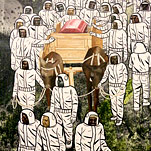HONG KONG — The Chinese government will ease its one-child family size restrictions and abolish re-education through labor camps, significantly curtailing two policies that for decades have defined the state’s power to control citizens’ lives, the Communist Party said on Friday.
China Plans to Abolish Labor Camps and Ease One-Child Policy
By CHRIS BUCKLEY
Published: November 15, 2013
Wang Zhao/Agence France-Presse — Getty Images
Since the 1970s, most urban Chinese couples have been restricted to one child.
Dispatches on the planet's most populous nation. Go to the Blog »
Related
-
China’s Economic Plans ‘Ambitious,’ Lew Says (November 16, 2013)
Connect With Us on Twitter
Follow @nytimesworld for international breaking news and headlines.
The changes were announced in a party decision that also laid out broad and potentially far-reaching proposals to restructure the economy by encouraging greater private participation in finance, vowing market competition in several important parts of the economy and promising farmers better property protection and compensation for confiscated land.
Senior party officials, led by President Xi Jinping, endorsed the 60 reform initiatives at a four-day Central Committee conference that ended Tuesday, but the decision was released Friday. Mr. Xi described the document as a bold call for economic renewal, social improvement and patriotic nation-building – all under the firm control of one-party rule.
“We must certainly have the courage and conviction to renew ourselves,” he said in a statement accompanying the decision. Both were issued by the official news agency, Xinhua.
“Overcome all the crosscutting restrictions, surmount the constraints of sectional interests,” said Mr. Xi, who was appointed party leader a year ago and made state president last March.
Mr. Xi has tried to project an image as a leader who can pursue a potentially conflicting agenda: bringing about broad economic and social shifts while also fortifying one-party rule. For months, analysts have speculated about the new economic policies that could be introduced at the meeting. But the planned changes to population policy and punishment, two areas where reforms have been debated, and delayed, for years, gave the decision significance beyond the economy and could stir public expectations of even bolder changes under Mr. Xi and Prime Minister Li Keqiang in the decade they are likely to spend in office.
“Xi Jinping may have the most concentrated power of any Chinese leader since Deng Xiaoping,” said Xiao Gongqing, a professor of history in Shanghai who closely follows Chinese politics and advocates “neo-authoritarian” rule to protect the march of market reforms. “Politically, he has pursued an ideological tightening, because he wants to prevent the kind of explosion in political demands that could come in a relaxed environment. That’s the biggest danger for any government entering a period of reform.”
For decades, most urban couples have been restricted to having one child. That has been changing fitfully, with rules on the books that couples can have two children if both parents are single children. But that policy will be now be further relaxed nationwide. Many rural couples already have two, or sometimes more, children.
“This is the first time that a central document has clearly proposed allowing two children when a husband or wife is an only child,” said Wang Guangzhou, a demographer at the Chinese Academy of Social Sciences in Beijing. “Now it’s just talking about launching this, but the specific policies have to be developed at the operational level.”
If carried through, the relaxation would mark the first significant nationwide easing of family-size restrictions that have been in place since the 1970s, said Wang Feng, a demographer who teaches at both the University of California, Irvine, and Fudan University in Shanghai. He estimated the policy could lead to 1 to 2 million more births in China every year, on top of the approximately 15 million births a year now.
“This step is really, I think, the middle step toward allowing all couples to have two children, and eventually taking away the state’s hand,” said Professor Wang. “But this shift is historical, it’s fundamental. To change the mentality of the society of policy makers has taken people more than a decade.”
- 1
- 2
This article has been revised to reflect the following correction:
Correction: November 15, 2013
An earlier version of this article misspelled the given name of the Chinese prime minister. He is Li Keqiang, not Kequang.












